|
Featured picture tools: |
These featured pictures, as scheduled below, appeared as the picture of the day (POTD) on the English Wikipedia's Main Page in February 2013. Individual sections for each day on this page can be linked to with the day number as the anchor name (e.g. [[Wikipedia:Picture of the day/February 2013#1]] for February 1).
You can add an automatically updating POTD template to your user page using {{Pic of the day}} (version with blurb) or {{POTD}} (version without blurb). For instructions on how to make custom POTD layouts, see Wikipedia:Picture of the day.Purge server cache
February 1
|
Nanga Parbat ("Naked Mountain"), in the Gilgit-Baltistan region of Pakistan. With a summit elevation of 8,126 metres (26,660 ft), the mountain is the ninth-highest mountain in the world. It was first climbed in 1953. Photograph: Waqas Usman
Recently featured:
|
February 2

|
American ventriloquist and stand-up comedian Jeff Dunham with his puppet "Achmed the Dead Terrorist". Dunham, whose puppets Time magazine has described as "politically incorrect, gratuitously insulting and ill tempered", uses Achmed to satirize terrorists. Photograph: Richard Mclaren
Recently featured:
|
February 3

|
A campaign poster from the National Union Party during the US election of 1864, showing presidential candidate Abraham Lincoln (left) and his running-mate Andrew Johnson. The Republican Party changed its name and selected Johnson, a former Democrat, to draw support from War Democrats during the Civil War. Lithograph: Currier and Ives, Restoration: Lise Broer
Recently featured:
|
February 4

|
Hurricane Bob, the first hurricane of the 1991 Atlantic hurricane season and the only one to make landfall on the contiguous United States, as it approaches New England. The Category 3 storm killed 17 people and caused $1.5 billion in damage. Photo: NOAA / Satellite and Information Service
Recently featured:
|
February 5
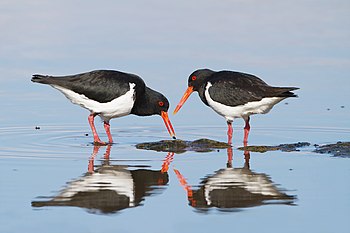
|
Two Pied Oystercatchers (Haematopus longirostris) in Tasmania; the one on the left is feeding on a small mussel. Although known as oystercatchers, they rarely feed on oysters. Photo: JJ Harrison
Recently featured:
|
February 6

|
Ronald Reagan (1911–2004) wearing a cowboy hat at his vacation home in Rancho del Cielo. Reagan, a former actor, purchased the ranch towards the end of his term as Governor of California. He and his wife Nancy would use the ranch throughout his presidency and into the 1990s. Photo: Michael Evans; Restoration: Peter Weis
Recently featured:
|
February 7
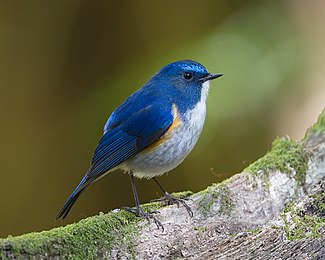
|
The Himalayan Bluetail (Tarsiger rufilatus) is a small passerine bird. Males are of a more vibrant colour than females. This specimen was photographed at the summit of Doi Inthanon in Thailand. Photograph: JJ Harrison
Recently featured:
|
February 8
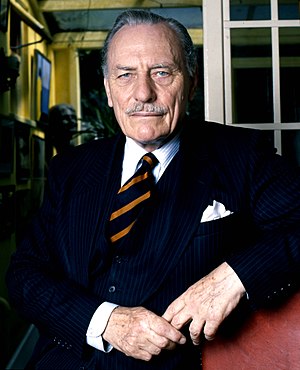
|
Enoch Powell (1912–98), a professor of Ancient Greek by age 25 and brigadier during World War II, took up politics in the late 1940s and in the 1960s was selected for several cabinet positions. In 1968, he gave the "Rivers of Blood" speech about the dangers of immigration to the United Kingdom and of proposed anti-discrimination legislation. Photograph: Allan Warren
Recently featured:
|
February 9
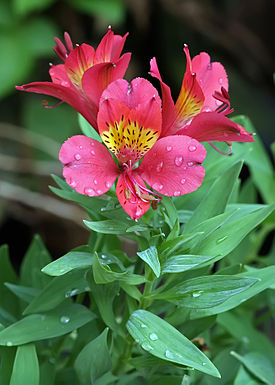
|
Alstroemeria × hybrida, an Alstroemeria hybrid, at the Lal Bagh Botanical Gardens in Bangalore, India. The genus consists of some 120 species and is native to South America. Photograph: Muhammad Mahdi Karim
Recently featured:
|
February 10

|
A Canon EOS 5D Mark II camera, pictured here with an EF 50mm f/1.4 USM lens. The Mark II, released in 2008 and discontinued in 2012, was the first DSLR to feature 1080p video recording. It has been used to shoot several television series and films. Photograph: Charles Lanteigne; Edit: Jjron
Recently featured:
|
February 11

|
The Cathedral of Christ the Saviour is a church in Moscow, Russia, south-west of the Kremlin, which was consecrated in 1883. With an overall height of 105 metres (344 ft), it is the tallest Orthodox Christian church in the world. Photograph: Joaquim Alves Gaspar
Recently featured:
|
February 12

|
The Marabou Stork (Leptoptilos crumeniferus) is an African wading bird which feeds mostly on carrion. With a wingspan verified to reach 3.19 m (10.5 ft), it has one of the largest wingspans of any land bird. This specimen was found in Mikumi National Park, Tanzania. Photograph: Muhammad Mahdi Karim
Recently featured:
|
February 13

|
A nude study in autochrome by Arnold Genthe. Autochrome was patented by the Lumière brothers in 1903 and became the dominant colour photography process for over two decades. It used dyed potato starch in its plates to provide colour. Because of additional filters necessary for the process, it required longer exposure than black-and-white plates. Photograph: Arnold Genthe; Restoration: Chick Bowen
Recently featured:
|
February 14

|
The Jewish Bride, an oil painting on canvas by Rembrandt dating from circa 1667. Described by Christoper White as "one of the greatest expressions of the tender fusion of spiritual and physical love in the history of painting", the painting obtained its likely inaccurate current name in the 19th century. Painting: Rembrandt
Recently featured:
|
February 15

|
An Australian Brushturkey (Alectura lathami) in Cairns, Queensland, Australia. The species, which measures up to 60–75 centimetres (24–30 in) in length, is the largest extant species of megapode. Although physically similar, the species is not closely related to the Turkey. Photograph: JJ Harrison
Recently featured:
|
February 16

|
A young girl standing amid the freshly made graves of 70 children in Dadaab, Kenya. Many of them died of malnutrition during an extensive drought in East Africa, which began in July 2011. Many people died on their journeys to the overcrowded refugee camps; the camp in Dadaab, although built for 90,000 people, held at least 440,000 at its peak. Photograph: Andy Hall
Recently featured:
|
February 17
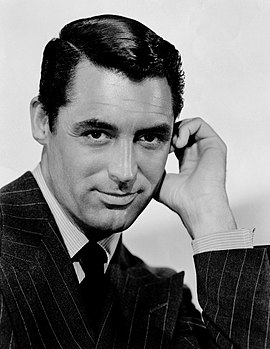
|
Actor Cary Grant (1904–86) in a publicity photo for Suspicion (1940). Known for his transatlantic accent, debonair demeanor and "dashing good looks", Grant is considered one of classic Hollywood's definitive leading men. During his 34-year career he acted in over 50 films, including The Eagle and the Hawk, Bringing Up Baby, and North by Northwest. Photograph: RKO publicity photographer; Edit: Chris Woodrich
Recently featured:
|
February 18

|
Astronaut Buzz Aldrin saluting the flag of the United States, part of the Lunar Flag Assembly, during Apollo 11. The Lunar Flag Assembly was designed to survive a Moon landing and to appear to "wave" as it would in a breeze on Earth. This flag fell over when the Lunar Module Eagle took off. Photograph: Neil Armstrong
Recently featured:
|
February 19

|
American professional golfer Morgan Pressel, who first qualified for the Women's Open at age 12. Pressel had her first victory in the Kraft Nabisco Championship in 2007. She made her first professional hole-in-one, an eagle, at that year's Jamie Farr Owens Corning Classic. Photograph: Keith Allison; Edit: Brandmeister
Recently featured:
|
February 20

|
The Bald Eagle (Haliaeetus leucocephalus) is a bird of prey found in North America. As visible here, adults are not bald, but have a head of white feathers. Its name comes from an older meaning of the word, meaning "white headed". Photograph: W. Lloyd MacKenzie
Recently featured:
|
February 21

|
Marrus orthocanna is a species of siphonophore, a colonial animal composed of a complex arrangement of zooids, some of which are polyps and some medusae. It lives at depths ranging between 200 and 800 m (660 and 2,600 ft), in the Arctic and other cold, deep waters. Photograph: Kevin Raskoff
Recently featured:
|
February 22

|
Sonia Sotomayor is an associate justice of the United States Supreme Court. She was nominated in 2009 by President Barack Obama to replace retiring Justice David Souter. Sotomayor is the first Hispanic and the third woman to be appointed to the Court. Photograph: Steve Petteway
Recently featured:
|
February 23
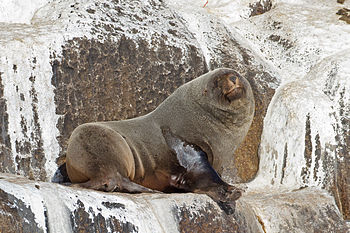
|
A brown fur seal (Arctocephalus pusillus) hauling-out on the Hippolyte Rocks off the coast of Tasmania. These large seals, which can measure over 2.2 metres (7 feet) in length, feed mostly on fish but are also known to eat squid and crabs. Photograph: JJ Harrison
Recently featured:
|
February 24

|
A Raja Shelduck (Tadorna radjah) at Centenary Lakes in Cairns, Australia. The Raja Shelduck prefers the brackish waters of mangrove flats and paperbark tree swamps, but will live elsewhere during the wet season. It feeds mainly on mollusks, insects, sedge materials and algae. Photograph: JJ Harrison
Recently featured:
|
February 25

|
A pile of American bison skulls, waiting to be ground for fertilizer; a man stands atop the pile, with another in front of it. Bison, long a staple of Plains Indian tribal culture, were aggressively hunted by European settlers in the United States, nearly leading to the extinction of the species. Photograph: Unknown; Restoration: Chick Bowen
Recently featured:
|
February 26

|
|
The Ames process was developed during the Manhattan Project to refine uranium. Left to right:
Photographs: Unknown
Recently featured:
|
February 27
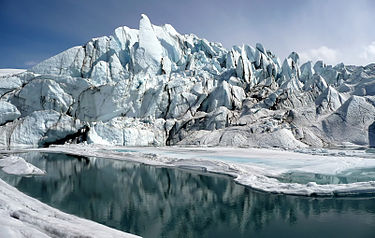
|
A portion of the terminus of Matanuska Glacier, a valley glacier in the US state of Alaska. At 27 miles (43 km) long by 4 miles (6.4 km) wide, the Matanuska Glacier is the largest glacier accessible by road in the country and the source of the Matanuska River, also seen here. Photograph: Sbork
Recently featured:
|
February 28

|
An 1872 lithograph depicting seven early African Americans in the United States Congress, (from left to right) Senator Hiram Revels and Representatives Benjamin Turner, Robert DeLarge, Josiah Walls, Jefferson Long, Joseph Rainey, and Robert Elliott. During the Reconstruction Era following the Civil War, some several hundred African-American officeholders were elected – all of whom were members of the Republican Party. Lithograph: Currier and Ives; Restoration: Adam Cuerden
Recently featured:
|
Picture of the day archives and future dates
